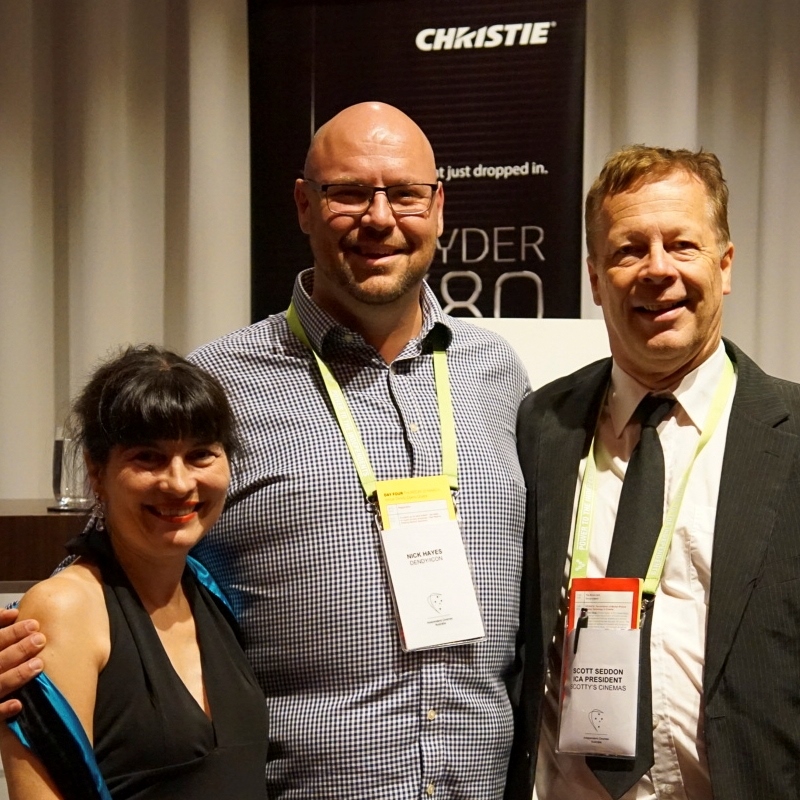(L-R) Adrianne Pecotic, Dendy’s Nick Hayes and Scott Seddon.
Netflix and other streaming services won’t kill the cinema industry and are in fact complementing rather than competing with the theatrical business.
That was the message from Independent Cinemas Australia president Scott Seddon in his opening address at ICA’s annual conference, Brilliant Entertainment – Better Bottom Line, at Palace Cinemas Como today.
Seddon called on exhibition companies’ directors, staff, patrons, friends, family and the media to emphasize the cinema experience is a social need which is growing, not shrinking.
“I want to reinforce the point that there is a misconception in the community in Australia and in most of the world that Netflix will lead to the demise of the theatrical cinema and that is crap. It’s not true,” he said.
Seddon recalled that when he and ICA CEO Adrianne Pecotic attended the CinemaCon convention in 2017 it was feared by some that Screening Room, which intended to charge consumers $US50 to watch new theatrical releases at home, would destroy the cinema.
The Screening Room initiative from Napster co-founder Sean Parker did not materialise in the face of opposition from some studios and the National Association of Theatre Owners.
Last year the perceived threat was subscription cinema, which has largely evaporated as Sinemia, which offered subscribers the chance to see one movie every day for $US14.99 per month, closed its operations in the US last week and competitor MoviePass is struggling.
“I wonder if Netflix is the crisis of the year,” he said in what may be a case of wishful thinking, given the streamer has 149 million subscribers worldwide.
Research conducted in the past two years in North America and Europe showed that the more hours people spend streaming content, the more movie tickets they buy.
“If competition with streaming services is an issue, the issue is that the competition for actors and directors is greater than that for consumers, with these new players bringing new production finance to the table,” he said.
“We need to acknowledge that Netflix is a truly innovative and successful business, and much of the fruits of this growth are being reinvested in the production of original content. But in January this year shares fell 4.8 per cent when revenue fell below projections for the first time. The customer base can’t keep growing forever.”
Underlining the robust health of the theatrical business, he pointed to 2018 as a record year for cinemas globally, with grosses of $US41.1 billion.
In Australia the box-office rose by 3.6 per cent to $1.245 billion, the second biggest year behind 2016, despite the average ticket price dropping from $14.13 to $13.86 due to discounting.
Most of the growth came from the usually elusive 12-25 age group. A study by Event Cinemas showed its audience in 2018 was the youngest and most diverse in the history of the company.
In her address Pecotic called for even greater trust between exhibitors and distributors, stating: “Today, more than ever, I urge exhibitors to put yourself in the shoes of your sales rep, and sales reps in the shoes of every independent exhibitor from small town to metro and art house circuits.
“For each individual transaction we can make substantial, sustainable gains by listening to how individual exhibitors deliver movie magic to all our many and varied customers around the country.
“I urge distributors to move away from the constant focus on national figures and weekly session times in exhaustive emails and phone calls and instead listen to how each individual indie exhibitor makes money from delivering the magic of movies to their unique customers at their unique location.
“By trusting each other to do our respective jobs we will reap rewards. By acting at each other’s expense we will fail our customers and our businesses.”


